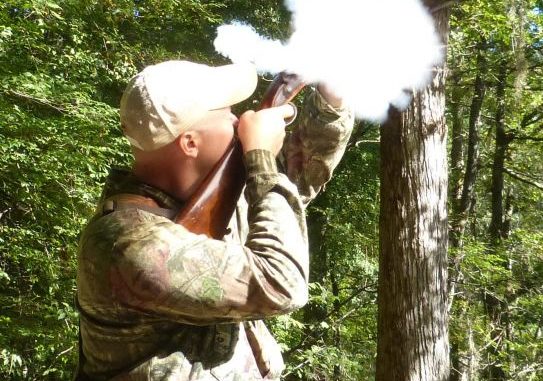
The flintlock musket was common on the early American frontier, and settlers’ lives often depended on it. As a result, flintlock terminology has become part of our everyday language.
Today, we use the phrase “lock, stock and barrel” to refer to a whole, but it originally was a reference to an assembled muzzleloading rifle.
“The rifle is a single unit, and everything mounts into the stock — the lock, stock and barrel,” Jim Gleason explained.
Jones put it another way.
“With a modern rifle, you can take everything out of the stock, and it will still fire,” he said. “But if you take everything out of a flintlock stock, you will wind up with the barrel, trigger and lock lying there separately.”
“Straight as a ramrod” refers to someone with a stiff, upright posture. Ramrods were originally made of wood, and had to be perfectly straight in order to ram the ball down the barrel and fit back into the ramrod holder.
When someone rockets to stardom but fails to succeed, we say they were a “flash in the pan.” This idiom’s origin is a reference to the musket’s pan powder igniting without setting off the barrel charge.
If one is facing a challenging situation, a friend might advise him to “keep your powder dry.” In modern times it means to safeguard your resources and be prepared to act, but it originated as practical advice to protect your black powder from the elements, because it will not ignite when damp.
Today, “going off half-cocked” means to act hastily or prematurely, but it has a flintlock origin. The hammer of a flintlock has to be pulled back to the half-cock — or safe— position to prime the frizzen, and then pulled back to full cock to fire.
Sometimes a musket would malfunction and fire with the hammer at half-cock.
If one does not have sufficient information to make a decision, he might say, “Let’s hang fire and not act on this until the full report comes out.”
“Hang fire” is another reference to a flintlock malfunction. Powder that is damp or of poor quality sometimes burns slowly, and there will be a long delay between the pan flashing and the barrel discharging.
This past November, many politicians were “long shots,” but few realized the history behind that label. Smoothbore flintlocks were very inaccurate, and hitting a target beyond 50 yards was more luck than skill.
Thus, taking a “long shot” meant having a slim chance of success.


